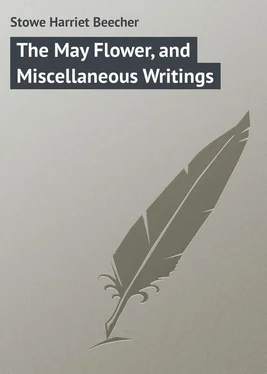Harriet Stowe - The May Flower, and Miscellaneous Writings
Здесь есть возможность читать онлайн «Harriet Stowe - The May Flower, and Miscellaneous Writings» — ознакомительный отрывок электронной книги совершенно бесплатно, а после прочтения отрывка купить полную версию. В некоторых случаях можно слушать аудио, скачать через торрент в формате fb2 и присутствует краткое содержание. Жанр: foreign_prose, на английском языке. Описание произведения, (предисловие) а так же отзывы посетителей доступны на портале библиотеки ЛибКат.
- Название:The May Flower, and Miscellaneous Writings
- Автор:
- Жанр:
- Год:неизвестен
- ISBN:нет данных
- Рейтинг книги:4 / 5. Голосов: 1
-
Избранное:Добавить в избранное
- Отзывы:
-
Ваша оценка:
- 80
- 1
- 2
- 3
- 4
- 5
The May Flower, and Miscellaneous Writings: краткое содержание, описание и аннотация
Предлагаем к чтению аннотацию, описание, краткое содержание или предисловие (зависит от того, что написал сам автор книги «The May Flower, and Miscellaneous Writings»). Если вы не нашли необходимую информацию о книге — напишите в комментариях, мы постараемся отыскать её.
The May Flower, and Miscellaneous Writings — читать онлайн ознакомительный отрывок
Ниже представлен текст книги, разбитый по страницам. Система сохранения места последней прочитанной страницы, позволяет с удобством читать онлайн бесплатно книгу «The May Flower, and Miscellaneous Writings», без необходимости каждый раз заново искать на чём Вы остановились. Поставьте закладку, и сможете в любой момент перейти на страницу, на которой закончили чтение.
Интервал:
Закладка:
Stowe Harriet Beecher
The May Flower, and Miscellaneous Writings
INTRODUCTION
Mr. G. B. Emerson, in his late report to the legislature of Massachusetts on the trees and shrubs of that state, thus describes The May Flower.
"Often from beneath the edge of a snow bank are seen rising the fragrant, pearly-white or rose-colored flowers of this earliest harbinger of spring.
"It abounds in the edges of the woods about Plymouth, as elsewhere, and must have been the first flower to salute the storm-beaten crew of the Mayflower on the conclusion of their first terrible winter. Their descendants have thence piously derived the name, although its bloom is often passed before the coming in of May."
No flower could be more appropriately selected as an emblem token by the descendants of the Puritans. Though so fragrant and graceful, it is invariably the product of the hardest and most rocky soils, and seems to draw its ethereal beauty of color and wealth of perfume rather from the air than from the slight hold which its rootlets take of the earth. It may often be found in fullest beauty matting a granite lodge, with scarcely any perceptible soil for its support.
What better emblem of that faith, and hope, and piety, by which our fathers were supported in dreary and barren enterprises, and which drew their life and fragrance from heaven more than earth?
The May Flower was, therefore, many years since selected by the author as the title of a series of New England sketches. That work had comparatively a limited circulation, and is now entirely out of print. Its articles are republished in the present volume, with other miscellaneous writings, which have from time to time appeared in different periodicals. They have been written in all moods, from the gayest to the gravest – they are connected, in many cases, with the memory of friends and scenes most dear.
There are those now scattered through the world who will remember the social literary parties of Cincinnati, for whose genial meetings many of these articles were prepared. With most affectionate remembrances, the author dedicates the book to the yet surviving members of The Semicolon.
Andover, April, 1855 .
UNCLE LOT
And so I am to write a story – but of what, and where? Shall it be radiant with the sky of Italy? or eloquent with the beau ideal of Greece? Shall it breathe odor and languor from the orient, or chivalry from the occident? or gayety from France? or vigor from England? No, no; these are all too old – too romance-like – too obviously picturesque for me. No; let me turn to my own land – my own New England; the land of bright fires and strong hearts; the land of deeds , and not of words; the land of fruits, and not of flowers; the land often spoken against, yet always respected; "the latchet of whose shoes the nations of the earth are not worthy to unloose."
Now, from this very heroic apostrophe, you may suppose that I have something very heroic to tell. By no means. It is merely a little introductory breeze of patriotism, such as occasionally brushes over every mind, bearing on its wings the remembrance of all we ever loved or cherished in the land of our early years; and if it should seem to be rodomontade to any people in other parts of the earth, let them only imagine it to be said about "Old Kentuck," old England, or any other corner of the world in which they happened to be born, and they will find it quite rational.
But, as touching our story, it is time to begin. Did you ever see the little village of Newbury, in New England? I dare say you never did; for it was just one of those out of the way places where nobody ever came unless they came on purpose: a green little hollow, wedged like a bird's nest between half a dozen high hills, that kept off the wind and kept out foreigners; so that the little place was as straitly sui generis as if there were not another in the world. The inhabitants were all of that respectable old standfast family who make it a point to be born, bred, married, die, and be buried all in the selfsame spot. There were just so many houses, and just so many people lived in them; and nobody ever seemed to be sick, or to die either, at least while I was there. The natives grew old till they could not grow any older, and then they stood still, and lasted from generation to generation. There was, too, an unchangeability about all the externals of Newbury. Here was a red house, and there was a brown house, and across the way was a yellow house; and there was a straggling rail fence or a tribe of mullein stalks between. The minister lived here, and 'Squire Moses lived there, and Deacon Hart lived under the hill, and Messrs. Nadab and Abihu Peters lived by the cross road, and the old "widder" Smith lived by the meeting house, and Ebenezer Camp kept a shoemaker's shop on one side, and Patience Mosely kept a milliner's shop in front; and there was old Comfort Scran, who kept store for the whole town, and sold axe heads, brass thimbles, licorice ball, fancy handkerchiefs, and every thing else you can think of. Here, too, was the general post office, where you might see letters marvellously folded, directed wrong side upward, stamped with a thimble, and superscribed to some of the Dollys, or Pollys, or Peters, or Moseses aforenamed or not named.
For the rest, as to manners, morals, arts, and sciences, the people in Newbury always went to their parties at three o'clock in the afternoon, and came home before dark; always stopped all work the minute the sun was down on Saturday night; always went to meeting on Sunday; had a school house with all the ordinary inconveniences; were in neighborly charity with each other; read their Bibles, feared their God, and were content with such things as they had – the best philosophy, after all. Such was the place into which Master James Benton made an irruption in the year eighteen hundred and no matter what. Now, this James is to be our hero, and he is just the hero for a sensation – at least, so you would have thought, if you had been in Newbury the week after his arrival. Master James was one of those whole-hearted, energetic Yankees, who rise in the world as naturally as cork does in water. He possessed a great share of that characteristic national trait so happily denominated "cuteness," which signifies an ability to do every thing without trying, and to know every thing without learning, and to make more use of one's ignorance than other people do of their knowledge. This quality in James was mingled with an elasticity of animal spirits, a buoyant cheerfulness of mind, which, though found in the New England character, perhaps, as often as any where else, is not ordinarily regarded as one of its distinguishing traits.
As to the personal appearance of our hero, we have not much to say of it – not half so much as the girls in Newbury found it necessary to remark, the first Sabbath that he shone out in the meeting house. There was a saucy frankness of countenance, a knowing roguery of eye, a joviality and prankishness of demeanor, that was wonderfully captivating, especially to the ladies.
It is true that Master James had an uncommonly comfortable opinion of himself, a full faith that there was nothing in creation that he could not learn and could not do; and this faith was maintained with an abounding and triumphant joyfulness, that fairly carried your sympathies along with him, and made you feel quite as much delighted with his qualifications and prospects as he felt himself. There are two kinds of self-sufficiency; one is amusing, and the other is provoking. His was the amusing kind. It seemed, in truth, to be only the buoyancy and overflow of a vivacious mind, delighted with every thing delightful, in himself or others. He was always ready to magnify his own praise, but quite as ready to exalt his neighbor, if the channel of discourse ran that way: his own perfections being more completely within his knowledge, he rejoiced in them more constantly; but, if those of any one else came within the same range, he was quite as much astonished and edified as if they had been his own.
Читать дальшеИнтервал:
Закладка:
Похожие книги на «The May Flower, and Miscellaneous Writings»
Представляем Вашему вниманию похожие книги на «The May Flower, and Miscellaneous Writings» списком для выбора. Мы отобрали схожую по названию и смыслу литературу в надежде предоставить читателям больше вариантов отыскать новые, интересные, ещё непрочитанные произведения.
Обсуждение, отзывы о книге «The May Flower, and Miscellaneous Writings» и просто собственные мнения читателей. Оставьте ваши комментарии, напишите, что Вы думаете о произведении, его смысле или главных героях. Укажите что конкретно понравилось, а что нет, и почему Вы так считаете.












